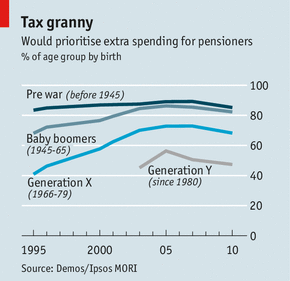(单词翻译:单击)
Social attitudes
社会态度
Generation gap
代沟
Why a resurgence in support for the welfare state won’t help Labour
为什么支持福利国家的呼声重起不利于工党
Sep 14th 2013 |From the print edition
MANY reasons can be found why public support for Britain’s welfare system should be waning. The economy remains debt-ridden, the deficit large. Five more years of austerity will drain funding from services Britons cherish, like schools and the NHS. It explains why politicians talk of “strivers”, aiming to tap into a perceived view that those receiving benefits have it easy.
可以找到很多公众支持英国福利制度逐渐减弱的原因。经济仍然债台高筑,财政赤字巨大。接下来五年的财政紧缩会耗尽英国人珍惜的公共服务所需资金,比如说学校和国民保健服务。这解释了为什么政治家谈论“奋斗者”,目的在于改变人们的观点,说明上述福利来之不易。
But new data suggest that politicians may have misjudged the public mood. The latest British Social Attitudes (BSA) survey, published on September 10th, revealed that sympathy for those on benefits, on a downwards trend since 1989, has started to rise. Those agreeing that benefits should “provide a decent standard of living for the unemployed” rose from 50% to 59% in the period between 2006 and 2012.
但是,最新数据表明政治家可能误判了公众的情绪。发布于9月10日的最新的英国社会态度调查显示自1989年以来都呈下降趋势的同情那些福利的情绪开始上升。同意福利应该给失业者提供一个合适的生活标准的比例从2006年的50%上升到了2012年的59%。
Those who thought benefits were “too high and discourage work” fell from 62% in 2011 to 51%, and more people thought cutting benefits “would damage too many people’s lives.” Alison Park, of the BSA team, says sympathy for benefits claimants often rises in recessions, but in this downturn the effect had not clearly appeared until this year’s data.
认为福利太高,抑制了工作积极性的比例从2011年的62%下降到了现在的51%,越来越多的人认为削减福利会损害太多人的生活。英国社会态度调查团队的Alison Park表示,同情福利救济者的比例会在经济衰退期有所上升,但是在这个衰退期,知道今年的数据出来作用才变得清晰。

Britons disagree on who should get cash, however. A report published by Demos, a think-tank, and Ipsos MORI, a pollster, showed that more than four-fifths of those born before 1965 would prioritise pensions over other benefits. Yet less than half of those born after 1980 would do so (see chart). Britons born before 1945 are less likely to support benefits for working-age groups than the average. Generations favour their own.
然而,对谁应该获得救济资金,英国人有分歧。一个智囊团Demos和民意调查机构Ipsos MORI发表的一份报告显示,超过五分之四的1965年以前出生的人将优先考虑养老金。而1980年以后出生的人中只有不到一半的人支持这样做。1945年以前出生的英国人更不可能支持给适龄工作人员增加福利,低于平均支持率。每一代人都维护自己的利益。
With more cuts expected after the next general election, which part of the welfare budget to spare divides Britain’s political parties. The Conservatives have promised to exclude pensions from any spending cap. With their own pots safe, the BSA data suggests grey-haired voters might welcome other cuts. Only 10% of the pre-war generation regard unemployment benefit as a priority. Single parent handouts are especially unpopular with older Britons: only 3% support them.
预计下一届大选之后福利削减会加大,福利预算的富裕与否是英国各政党之间的区别。保守党已经承诺排除养老金的支付上限。英国社会态度数据显示,老年人自己的福利有保障之后,他们可能会欢迎其他福利的削减。只有10%的战前公民会优先选择失业福利。单亲救济在英国老年人中最不受欢迎,他们中只有3%的人支持这项福利。
Labour’s brand of austerity should appeal more to the young. They propose to cap pensions, and oppose further cuts to child and housing benefits. It may prove a risky strategy: 76% of over 65s turned out to vote at the last election, whereas only 44% of those aged 18-24 bothered to do so. Labour’s poll lead is already dwindling, rising support for welfare may well quicken the pace.
工党紧缩的形象对年轻人更有吸引力。他们提出限制养老金,反对对儿童和住房福利的进一步缩减。这可能是一项有风险的策略:上次选举的时候76%的65岁以上的民众参与选举,而18到24岁的民众只有44%的比例参与选举。工党的领先优势已经在减少了,对福利的支持可能会加快其优势减少的步伐。


